October 2016

नवलक्षधनुर्धराधिनाथेपृथिवीं शासति वीररुद्रभूपे |अभवत्परमाग्रहारपीडाकुचकुम्भेषु कुरङ्गलोचनानाम् ॥
Vidyanatha who lived in the thirteenth century was a great poet and rhetorician. He wrote a compendium of alankara shastra titled Prataparudrayashobhushanam. This work, until recently, was the pet-book of scholars. It belongs to the dhvani school of thought, and is a dependable text that gives definitions and examples of almost all concepts of Indian...
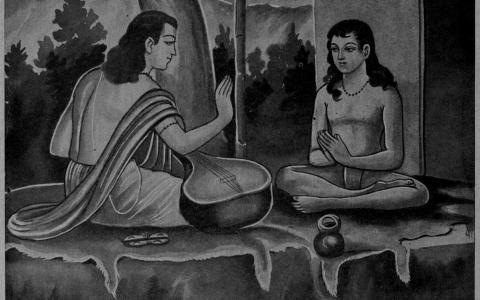
In the second part of this series, we take a look at the next twenty-one sutras of Narada on bhakti (verses 22 to 42).
तत्रापि न माहात्म्यज्ञानविस्मृत्यपवादः । २२
22. Even so (in the case of the cowgirls), one can’t criticize them of being oblivious to the awareness of divinity.
तद्विहीनं जाराणामिव । २३
23. Without this awareness, (love) is akin to the lust of a paramour.
[Without the awareness of divinity, love gets reduced to lust. This sutra...

An eminent man of letters and a well-known personality, whom I loved and respected as an elder brother (Dr. B K Narayana Rao) would often say this about his guru: the positive influence that Garani Krishnacharya’s personality had on him was unmatched. Krishnacharya’s scholarship was great but even greater was the beauty of his character. He was elegant both outside and within. Everybody felt the need for his presence, his friendship, and his...
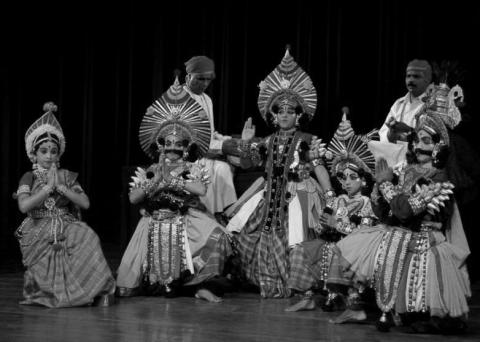
Vaachikaabhinaya (vocal communication – through words) is of two kinds – songs/ poems set to a rhythmic cycle (taala) and prose. Kuchupudi, Bhagavatamela and Kathakali have completely adopted Carnatic classical music today. This is even more prominent in Melattur Bhagavatamela. Kuchupdi has retained some special features of the Natya-sangeetha of Andhra. One can observe traces of Sopaana-Sangeetha in Kathakali, but it does not have the regional...

ಭಾರತೀಯರು ಹಬ್ಬಗಳನ್ನು ವ್ರತ, ಪರ್ವ, ಮತ್ತು ಉತ್ಸವಗಳೆಂದು ಪ್ರಾಯಿಕವಾಗಿ ಮೂರು ವರ್ಗಗಳಲ್ಲಿ ಕಂಡರಿಸಿದ್ದಾರೆ. ವ್ರತ ವೈಯಕ್ತಿಕವಾದದ್ದು. ಧರ್ಮ-ಮೊಕ್ಷಗಳಿಗೇ ಅಲ್ಲಿ ಪ್ರಾಧಾನ್ಯ. ನಿಯಮ-ನಿಷ್ಠೆಗಳ ಅಂತರ್ಮುಖತೆಗೇ ಅಲ್ಲಿ ಅಗ್ರತಾಂಬೂಲ. ಪರ್ವ ಕೌಟುಂಬಿಕವಾದದ್ದು. ಇಲ್ಲಿ ಅರ್ಥ-ಕಾಮಗಳೂ ಹದವಾಗಿ ಕಲೆಯುತ್ತವೆ. ನಿಯಮ-ನಿಷ್ಠೆಗಳಿಗೆ ಹಾಳತವಾದ ಆತ್ಮೀಯತೆ, ಅಚ್ಚು-ಕಟ್ಟುಗಳೂ ಕೂಡಿಕೊಳ್ಳುತ್ತವೆ. ಉತ್ಸವವು ಸಾಮೂಹಿಕ(ಸಾಮಾಜಿಕ)ವಾದದ್ದು. ಇದನ್ನು ಒಂದು ಕಾಲದಲ್ಲಿ 'ಸಮಾಜ'ವೆಂದೇ ಕರೆಯುತ್ತಿದ್ದರು. ಇಲ್ಲಿ ವಿಲಾಸ-ವೈಭವ-ಸಂತೋಷಗಳು ಮೆಲ್ಗೈಯಾಗುತ್ತವೆ. ಅರ್ಥ-...
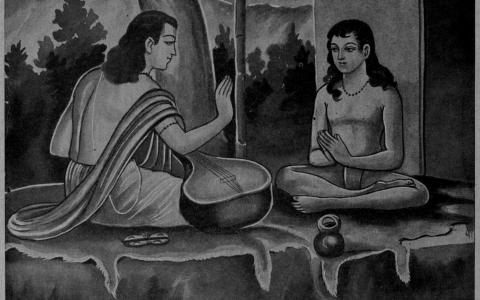
The divine sage Narada is credited with the composition of eighty-four sutras (aphorisms) on bhakti (devotion). In this four-part series, I provide simple English translations of the sutras. I will first present the original in Devanagari and then the translation.
अथातो भक्तिं व्याख्यास्यामः । १
1. Now thus we shall discuss in detail about bhakti.
[The word 'bhakti' is derived from the root ‘bhaj,’ which means ‘share,’ ‘participate,’ ‘divide...
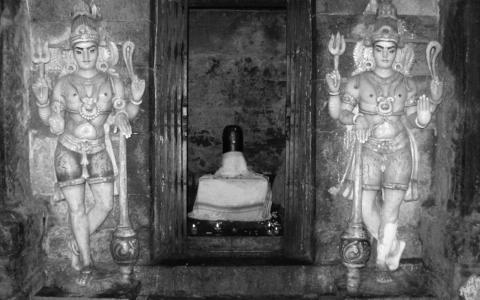
Nilakantha Dikshita is one among the fine Sanskrit poets in whom we find a happy blend of erudition and creativity. He lived during a time when natural expression of the language was chained to a heavy boulder of exhibitionism, and originality suffered under its weight. Only a few poets could use this to their advantage. Kshemendra, Bhallata and Venkatadhvari barely managed to liberate themselves from this fetter and let their words flower...
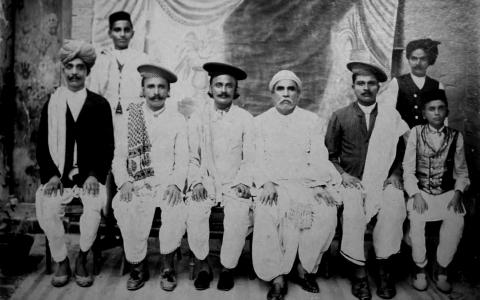
Kosambi hurls an accusation at Krishna for being the creator of the system of varnas –
“Not only that, the god himself had created such differences (G.4.13): “The four-caste (class) division has been created by Me”; this is proclaimed in the list of great achievements. The doctrines are certainly not timeless.” (Emphasis is mine)
(M&R, p.19)
While doing so, it is strange that Kosambi fails to quote the other half of the verse. The original...
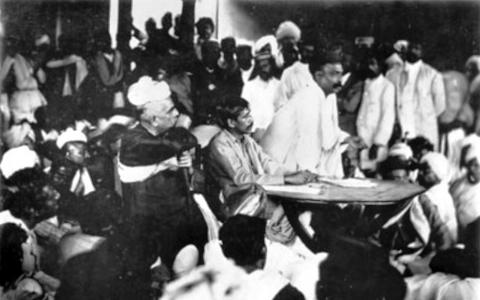
The Indian Councils Act of 1909 (popularly known as the Morley-Minto reforms) gave the Muslims of India a separate electorate. This was a strategy of the British to create a further rift between the Hindus and Muslims, which had already begun in 1905 when Bengal was partitioned on religious lines. Sharply criticizing this development, Aurobindo wrote (emphasis mine):
The question of separate representation for the Mahomedan community is one of...

Apart from writing independent works like the Outlines of Indian Philosophy and Essentials of Indian Philosophy, Hiriyanna edited several difficult Sanskrit books on Vedanta and made them easily accessible to readers by providing explanatory notes. Three such notable works include (1) Vedantasaara[i] (2) Naishkarmya Siddhi[ii] (3) Ishtasiddhi[iii]. Even among these three, Hiriyanna’s preface to Ishtasiddhi (a very technical and difficult work...
